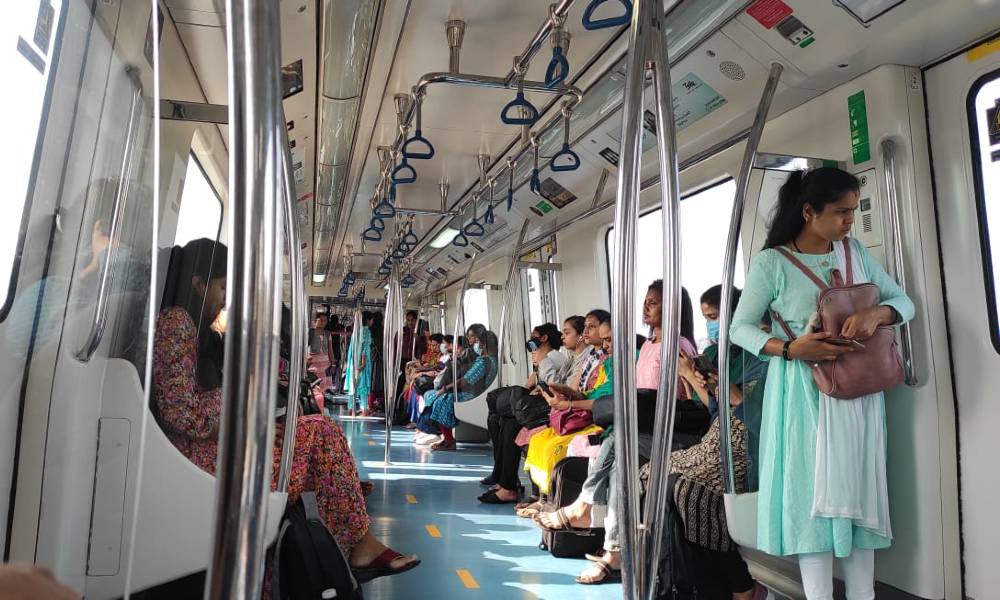Karnataka has reported the highest JN.1 variant cases in the country, followed by Andhra Pradesh and Maharashtra. Doctors have attributed the increase in COVID cases to more tests being done across the country.
Most people in the city are unaware of the mandatory mask guidelines for the elderly and people with co-morbidities. Despite a significant increase in the numbers of new COVID cases, people are not wearing masks in crowded places like metro and markets.
Most are unaware of the guidelines while others find it uneasy to wear masks. Elderly are travelling in crowded metros without any precautions.
Sundaram R, 67 years old, travelling on the Purple Line metro in Bangalore said, “I don’t know about the government guidelines and I am not wearing a mask because it is suffocating.”
Vennala Acharya, in her late seventies at the Kengeri Metro station said that if she knew about the compulsion of masks in public places for the elderly, she would wear it but accepted that it is otherwise uncomfortable and has lost the habit of wearing masks.
Karnataka government on January 18, started a booster dose campaign in the state for frontline workers and those above the age of 60. While the incidence of COVID cases is gradually coming down after the sudden surge in JN.1 variant COVID cases in first two weeks of the new year the government has issued guidelines for the elderly and people with co-morbidities to mandatorily wear a mask in public places.
While a total of 1,226 JN.1 cases were reported in the country, the state reported 89 new COVID cases in the last 24 hours (January 21, 2024), making the number of total active cases, 497 in Karnataka, one of the highest in the country.
Dr. Deepak S, Medical Superintendant at Victoria Hospital, Bangalore said that although the new Coronavirus variant is gaining traction in the state, it is not a cause of worry and concern as the symptoms of the JN.1 variant are relatively mild.
“More cases are being reported because people are again coming out to get tested. We have seen a surge in the COVID cases but less than one per cent of them need intensive care. This is majorly because of the acquired herd immunity and universal vaccination,” he said explaining the severity of the latest cases.
A senior health official at the Department of Health and Family Welfare, Karnataka said that although the reported cases have been dropping since the last two days, the government will keep the mask mandate until the situation is satisfactorily under control.
Dr. Deepak S, said, “Around 12-15 per cent of the total cases that have come in the last few weeks were of people with comorbidities and in the elderly, therefore people who are more prone to develop complexities must maintain extra precautions.”
Dr. Rashmi Pragati, a general physician in Pune, emphasized the importance of awareness along with other factors like proper diet to maintain immunity. She said, “One of the most important thing we have to pay attention to is access to healthcare. It is difficult for the elderly to get the kind of timely attention they need if they become COVID positive because of underlying health conditions.
“It becomes cardinal to follow the principal of preventing the disease is better than curing it,” she added.
The JN.1 COVID variant
The first case of the new COVID variant was reported in Kerala in December 2023 while currently 12 states have reported the new variant.
The World Health Organization (WHO) has termed the new variant as Variant of Interest with low global public health risk. JN.1 is a descendent lineage of BA.2.86, with the earliest sample collected on August 25, 2023.
According to WHO, the countries reporting the largest proportion of JN.1 sequences are France (20.1 per cent, 1552 sequences), the United States of America (14.2 per cent, 1072 sequences), Singapore (12.4 per cent, 934 sequences), Canada (6.8 per cent, 512 sequences), the United Kingdom (5.6 per cent, 422 sequences), and Sweden (5.0 per cent, 381 sequences).




